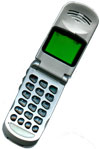Dear Umbra,
After many years of idealistic holdout, I have finally decided to own a cell phone; changes in my lifestyle have made the benefits too heavy to be outweighed by the detrimental effects. However, I would like to minimize the impact of my decision (brain tumors notwithstanding), so I am searching for the most long-lasting, recyclable, Earth-friendly cell phone I can find. Does such a thing exist? Where can I get one? Is “Earth-friendly cell phone” a contradiction in terms?
Dan
Seattle, Wash.
Dearest Dan,
Your letter filled me with bittersweet camaraderie. I, too, am soon to enter the world of cell-phone ownership after many years of cranky, righteous avoidance. I can only hope that you and I will eschew the worst rudeness of cell-phone users, stay cancer-free, and do the best we can to reduce the toxicity of our new portable objects.

Phone and dandy?
Cell phones, though small, are becoming a waste and pollution problem in the industrialized world due to planned obsolescence. The average cell-phone ownership period is about 18 months; presumably, the phones are replaced as owners find sexier new models, change phone plans, or accidentally leave their phones on the trunk of the car and drive away. People may regret the latter, but as a general rule they don’t think twice about dumping their phones in the trash can. (And rumor has it that disposable phones will be available soon, horror of horrors.)
One cell phone is not much of a problem, but waste experts are expecting millions and millions to enter the waste stream in the coming decades. And that is a problem, because cell phones are full of “persistent, bioaccumulative, and toxic chemicals,” or PBTs, which can accumulate in the fatty tissues of animals and do all sorts of exciting damage to organs, nerves, and cells. Cell phones contain lead, cadmium, nickel, and brominated fire retardants; once pulverized in the landfill these can contaminate air and groundwater, where they may cause cancer, brain tumors, endocrine disruption, and other problems you’d just as soon avoid.
Naturally, Europe and Japan are moving ahead rapidly to stem the toxic-waste tide by establishing stricter manufacturing standards, mandating that all phones work with all service providers, and creating “extended producer responsibility” regulations, which involve manufacturers in reclamation and recycling programs. The U.S., naturally, is ambling along slowly doing not much at all. Cell phones sold in the E.U. and Japan are hence a little greener than those sold in the U.S.

A tough cell.
But what about us poor sods who don’t live in Europe or Japan? Short of flying overseas to purchase a cell phone — a move that would vastly outweigh the environmental benefits of a green phone — we’re out of luck on the purchasing end. However, there are some things we can do on the user end to limit the environmental impact of our phones.
To wit: Commit to owning your cell phone for as long as possible. When the time comes to get rid of it, pass it along right away; don’t let it languish in a drawer and become completely obsolete. There are a wide variety of recycling programs, ranging from industry recycling to charitable organizations providing victims of domestic violence with emergency phone minutes. (Many cell phones can be used to dial 911 even when they no longer have other services available.) A short web search will turn up the recycling program of your particular carrier (if it has one) or an organization in your area working to reduce cell-phone waste.
You can also help turn up the heat on the U.S. cell-phone industry by calling and telling them you’d like a product free of lead and brominated fire retardants; while you’re at it, lean on the government to pass stricter regulations for manufacturers. For the rest of you folks who are still holding out against the handheld rudeness machine, I say: hang tough. You give hope to the fallen.
Dilatory,
Umbra


